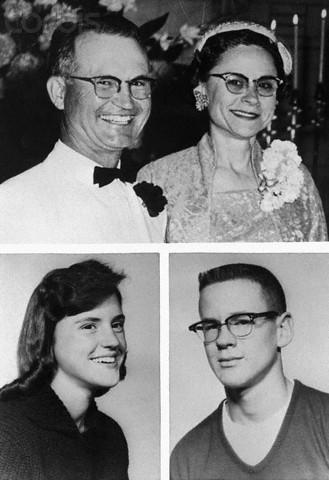I felt that I got to know not only the Clutter family, including the tragic figure of Herb's wife, Bonnie, but many of the people of Holcomb as well from the book. It really is one of the few that deserves the description of classic. In Cold Blood, is a chilling yet thoroughly gripping account of the murder in western Kansas at the turn of the decade so many years ago.
I'll admit to being conflicted. As my posting history reveals, I have absolutely zero tolerance for homosexuality and its equally evil twin, liberalism. Yet, grudgingly I must admit that Truman Capote's work, which I just re-read a few weeks ago, is among the very finest writing of the 20th Century. It really is a shame that one blessed with so much talent willfully and deliberately engaged in the deviancy of the sodomite deathstyle. With God, all things are possible and I hope that Truman Capote sincerely repented and sound salvation at the end of his short life. Otherwise, in spite of his writing prowess, Capote is surely (and justifiably) suffering for all eternity along with the murderers, Perry Smith and Richard Hickock.
These revelations about the inaccuracies and fabrications certainly do detract from the narrative but, that said, the mastery of the language, with a stark, minimalist style, while being respectful of the Holcomb citizens (probably due to Capote's Southern upbringing), remains as these brief snippets reveal:
The village of Holcomb stands on the high wheat plains of western Kansas, a lonesome area that other Kansans call "out there." Some seventy miles east of the Colorado border, the countryside, with its hard blue skies and desert-clear air, has an atmosphere that is rather more Far West than Middle West.
Until one morning in mid-November of 1959, few American - in fact, few Kansans - had ever heard of Holcomb. Like the waters of the river, like the motorists on the highway, and like the yellow trains streaking down the Santa Fe tracks, drama, in the shape of exceptional happenings, had never stopped there. The inhabitants of the village, numbering two hundred and seventy, were satisfied that this should be so, quite content to exist inside ordinary life - to work, to hunt, to watch television, to attend school socials, choir practice, meetings of the 4-H Club. But then, in the earliest hours of that morning in November, a Sunday morning, certain foreign sounds impinged on the normal nightly Holcomb noises - on the keening hysteria of coyotes, the dry scrape of scuttling tumbleweed, the racing, receding wail of locomotive whistles. At the time not a soul in sleeping Holcomb heard them - four shotgun blasts that, all told, ended six human lives. But afterward the townspeople, theretofore sufficiently unfearful of each other to seldom trouble to lock their doors, found fantasy recreating them over and again - those somber explosions that stimulated fires of mistrust in the glare of which many old neighbors viewed each other strangely, and as strangers.

Herb, Bonnie, Nancy and Kenyon Clutter